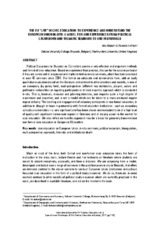The EU “live” in civic education: to experience and understand the European Union in-situ: a model for and experiences from political excursions and thematic seminars to and in Brussels
Autor
Weber, Iris
Kötter, Richard
Editor
Universidad de Córdoba, UCOPressFecha
2017Materia
Civic education on European UnionIn-situ seminars
Political excursion
Triangulation
Multi-perspective approach
Thematic and institutional depth
METS:
Mostrar el registro METSPREMIS:
Mostrar el registro PREMISMetadatos
Mostrar el registro completo del ítemResumen
Political Excursions to Brussels on EU matters can be a very effective and important methods
and format of civic education. Based on experience from practice, this can be the case in particular
if they are conceived of, organised and implemented as in-situ seminars, which has been practised
in over 40 seminars since 2004. The format we advocate and demonstrate here, with an early
qualitative evaluation based on the literature and contrast to other practices and models, is one of
an exemplary (by policy field), multi-perspective (different key institutions, players, actors and
preferable nationalities on inputting participants or at least experts) approach which is conducted
in-situ. This is, however, resource and planning intensive, and requires quite a high degree of
experience and expertise, and is not a model which can be taken to a mass-produced regular
repeat delivery. The learning and engagement of voluntary participants in non-formal education, in
addition to (though at times in partnership with) formal education institutions - such as secondary
schools or universities – is very significant and has been shown and evaluated to be of a high level
of quality with significant nation-wide appeal in Germany and of staying power in the market for
civic education. We also reflect on how this approach may be a basis for genuinely trans-national
non-formal civic education in Europe on EU matters.

